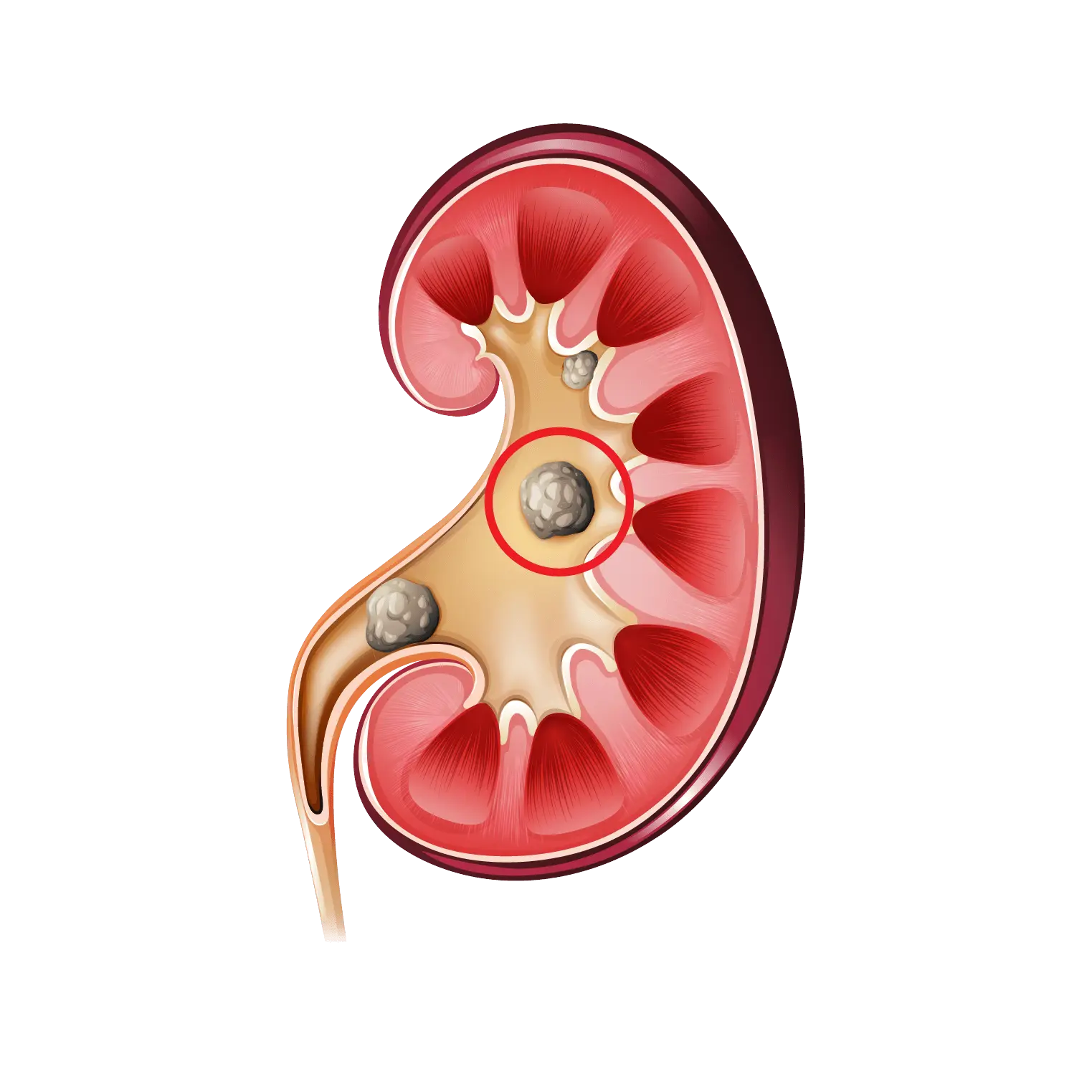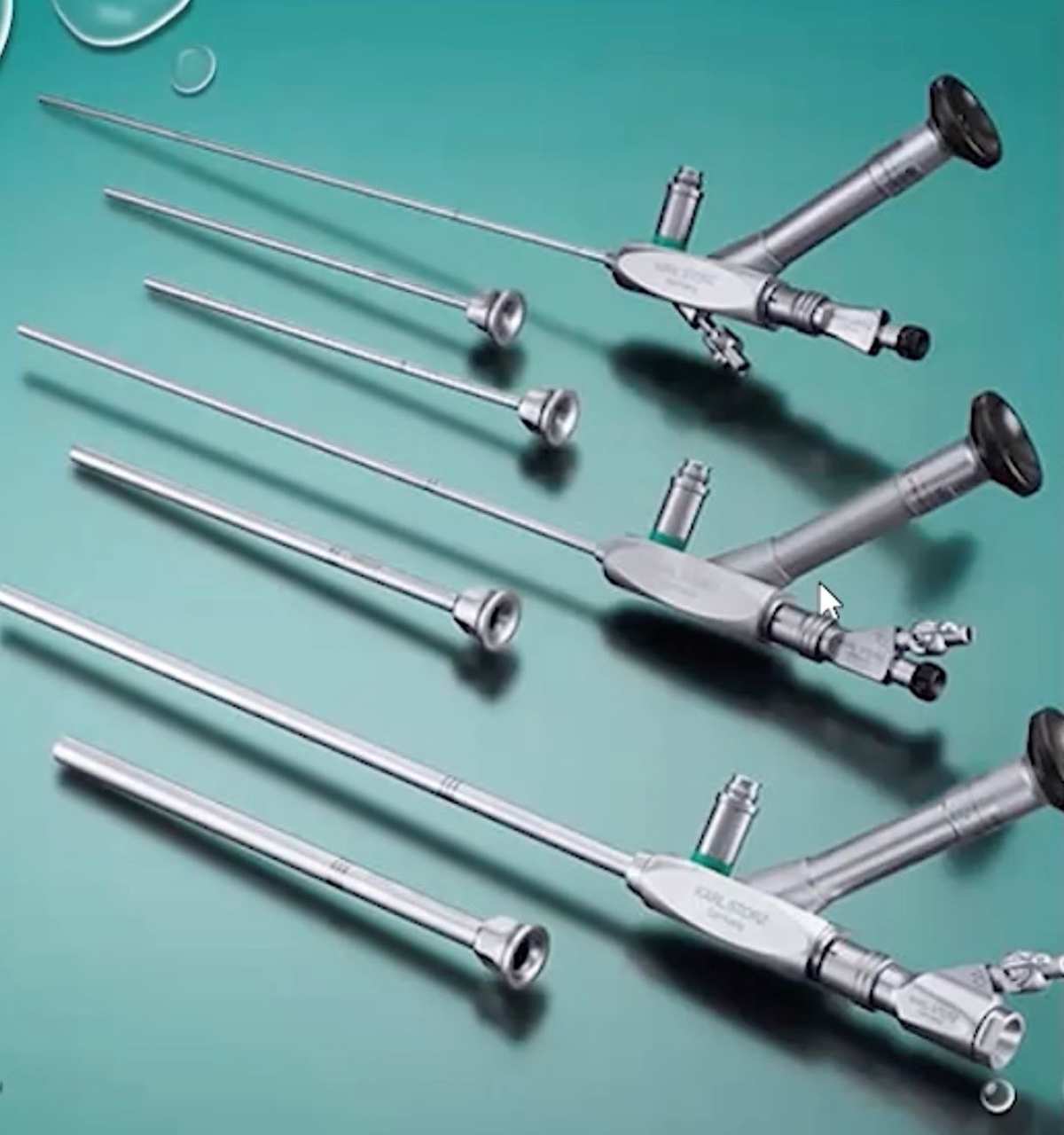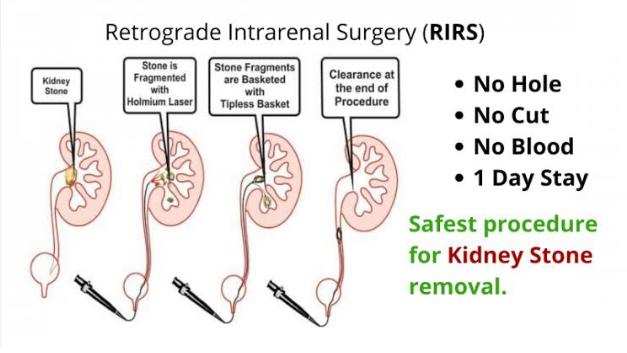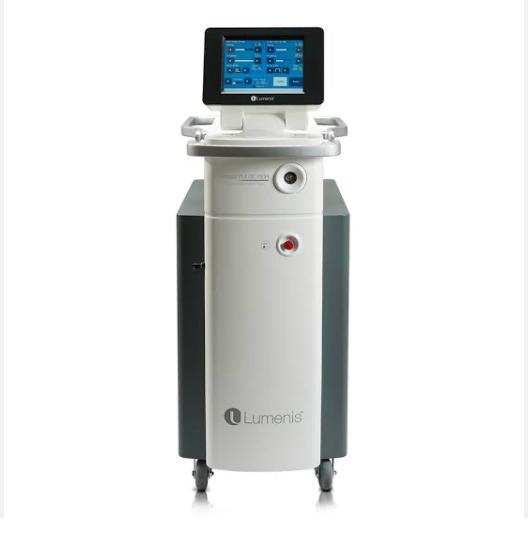Kidney Stone Treatment
Kidney Stones
Kidney stones are one the most common urological disorder in world affecting up to 15% of the population. It is known to recur in 50% of the cases. Calcium, oxalate, uric acid, and cystine are some of the chemicals found in the urine that if occurs in excess, combine into a solid mass known as kidney stones. When the amount of waste and water contained in urine is not properly balanced, crystals start to form which act as a magnet for other materials until the stone formation stage. The presentation of kidney stones also known as renal colic is characterised by severe upper back pain, with haematuria or presence of blood in the urine. There may also be symptoms such as nausea and vomiting, fever or chills with cloudy, often bad – smelling urine.
At Ananta Urology and Robotics Clinic, we have the latest high-powered Laser of 100W to provide the best Laser Kidney Stone Treatment in Ahmedabad.

Dr. Rohan Patel is recognised as Kidney Stone Specialist, with an experience of more than a decade in the field of Urology and having treated thousands of Kidney stones patients all over from Gujarat, Rajasthan, Madhya Pradesh and rest of India. His remarkable track record in addressing the Kidney stone aliments attracts patients from all over India and abroad for all Urological disorders.
If you too are suffering from kidney stone issues and searching for the Best Laser or Robotic Treatment for Kidney Stones in Ahmedabad, Contact Now.
WHAT ARE THE SYMPTOMS OF KIDNEY STONES?
The size of kidney stones are highly variable, with some being the size of grain of sand and others so large that they can be compared to pebbles or golf balls. However not always, the size of the stone is proportional to the patients manifestation scale.
Most common symptoms or signs of Kidney Stones include -
⦁ Feelings of nausea or episodes of vomiting
⦁ Fever accompanied by chills
⦁ Intense pain radiating from either side of the lower back
⦁ Persistent discomfort or a lingering stomach ache
⦁ Presence of blood in the urine
⦁ Pain during urination
⦁ Urine that emits a foul odour or appears cloudy
⦁ Burning during urination
⦁ Decreased urine output
The cause of pain associated with the kidney stone is due to either infection of the kidney or blockage/obstruction of ureter by it thereby irritating or hindering the progress of urine into bladder. This discomfort quickly progresses to unbearable pain. In case of complete obstruction of ureter or Bilateral stones, patient may develop no or decreased urine output. As the kidney is responsible for excretion of waste from body, blockage may sometimes lead to life threatening Infection, or Kidney Failure requiring kidney removal (Nephrectomy).
WHAT ARE THE CAUSES OF KIDNEY STONES?
Most of the cases of kidney stones do not have a specific cause. In 5-10% of the cases, underlying metabolic causes or urinary tract diseases predisposes to increased chances of kidney stones.
Some of the common predisposing factors include -
⦁ Elevated levels of uric acid, calcium, oxalate, and cysteine in urine.
⦁ Dietary habits rich in protein and sodium.
⦁ Chronically low water intake.
⦁ Excessive consumption of sugary foods and beverages.
⦁ History of gastric or intestinal surgeries.
⦁ Use of specific medications.
⦁ Presence of kidney cysts or related conditions.
⦁ Gastrointestinal disorders
⦁ Being overweight or obese.
In this light, all these factors help create an environment in kidney for development of stones or its recurrence under various permutations, aiding in unravelling the relationship between genetic build up and mode of life.
DIAGNOSIS OF KIDNEY STONES
Patient usually presents to a nearby specialist with complaints of back pain or burning micturition. In rare cases patient may present with decreased urine output or Kidney Failure. On presentation, Urologist will perform thorough examination, and order few radiological and blood tests. Blood tests are done to make sure your kidneys are functioning correctly and to look at the amounts of chemicals that can form into kidney stones, such as calcium.
Urine tests - Urine analysis for infection and stone fragments.
X-ray of abdomen - for evaluation of the dimensions of kidney stone.
CT scan - A CT scan KUB is done to identify precise stone size and position, along with anatomy of urinary tract from kidney to bladder thereby aiding in making treatment decisions.
TYPES OF KIDNEY STONE TREATMENT
Management of Kidney stones has been revolutionised by availability of miniaturized instruments and lasers, leading to decreased morbidity and side effects associated with treatment. At our hospital, senior urologist Dr. Rohan Patel uses advanced technology like laser and flexible endoscopes to treat his kidney stone patients and relieve them of their pain. If you are looking for the Best Hospital for Laser or Kidney Stone Treatment in Ahmedabad, you can visit Ananta Urology and Robotics Clinic for the same.
The Kidney Stone Treatment provides several options to help you find relief from pain :

Mini PCNL (Percutaneous Nephrolithotomy) - PCNL or Percutaneous Nephrolithotomy is the standard method for treating large kidney stones (more than 2 cm). However, standard Nephroscopes are large and require making a hole of 8-10 mm in kidneys. At our hospital, we have latest and the smallest nephroscopes also known as Mini PCNL to treat the patient with kidney stones. It involves making only a small incision of 3-4 mm at the back to insert a scope to fragment the stones with Laser. A smaller incision allows for faster recovery from surgery compared with the traditional procedure and decreased complication rates. We routinely discharge our patients within 24 hours of this Laser Kidney Stone Treatment in Ahmedabad.
RIRS (Retrograde Intrarenal Surgery) - RIRS is the state-of-the-art and the most advanced form of minimally invasive operation available today in the world for nephrolithiasis, which is intended for treatment of kidney stones as well as upper ureteric stones. During RIRS, a small flexible ureteroscope is passed through the urethra to access the kidney so as to observe and remove stones after breaking it with Laser. No incisions or cuts are made thereby decreasing pain, bleeding, kidney damage and morbidity. Having the Best Urologist for RIRS at our clinic, our patients usually go home within one day and resume work within 2-3 days.

ESWL (Extracorporeal Shock Wave Lithotripsy) - This non-invasive therapy uses ultrasound or mechanical waves created from outside to fragment stones into tiny flakes. It is recommended for small to medium-sized kidney stones (less than 15 mm). It has benefits such as little pain, and no incisions required while replacing minimally invasive surgeries. It provides a relatively fast recovery even within 2 days of the operation. Nonetheless, certain stones may not be appropriate for performing ESWL due to size or other patient factors, and hence multiple sessions may have to be used in clearing them completely. We have expert to treat your kidney stones problem via the best Conventional, Laser, or Robotic Surgery in Ahmedabad.

Laser Surgery - Laser Kidney Stone Treatment refers to the use Holmium or Thulium laser beam as a surgical tool to break kidney stones into small pieces or dust, with minimal tissue damage. It allows for more focused and precise procedures.
It is a standard tool in urology armamentarium to disassemble the stones in kidneys (laser lithotripsy) or to remove excess prostate tissue in condition of Benign Prostatic Hyperplasia (BPH).
Advantages of Laser Surgery
⦁ No cut or Incision
⦁ higher success rates
⦁ shortened operative period
⦁ Less Complications
⦁ lower incidence of Bleeding
⦁ Less pain
At our centre, Dr. Rohan Patel, the Best Surgeon for Kidney Stone Treatment in Ahmedabad, routinely performs the removal with RIRS and mini-PCNL, so that our patients can resume work at the earliest and avoid major morbidity and complications.









